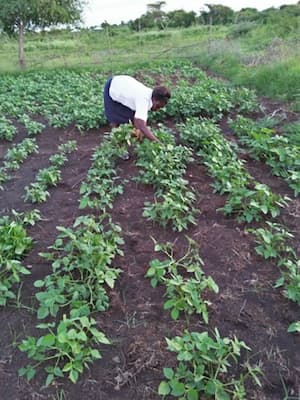Challenges to food security – the global picture
- Food insecurity was already on the rise before the pandemic, increasing from 23.2% of the world’s people in 2014 to 26.4% in 2018; and a lack of adequate nutrition was already a pervasive problem, causing stunting of children’s growth (United Nations, 2021).
- The pandemic made this worse. World Food Programme has found that the cost of a basket of basic foodstuffs increased by 10% during the pandemic (WFP, 2021).
Challenges to food security – local community perspectives
With the widespread loss of jobs due to the economic repercussions of Covid-19, food security has become an acute problem for individuals, families and communities. Loss of income leaves people without enough food to eat, while lockdowns to prevent the spread of coronavirus have, in some cases, barred people’s access to fields and pastures to produce food. Among the many Voices from the Frontline stories echoing this theme are those from an informal settlement in Colombia, a rural community in Kenya and peri-urban communities in South Africa.
In El Alto Fucha, an informal settlement in Bogota, Colombia, Jhody Katherine Sánchez Beltrán described how, when the country went into lockdown, “neither the national or local government guaranteed food and free public services…. If people cannot access a job,” she asked, “then what can they live on?” Particularly hard-hit were informal workers without regular waged employment, among whom there was a ‘great shortage’ of food. While conducting a Covid hygiene campaign in the settlement, Ms Sánchez Beltrán saw that people were ‘starving’.
It was a similar story in Siaya, Kenya, on the shores of Lake Victoria. Linnet Obonyo, a community health worker, observed: “Families soon ran out of food as people were losing jobs due to the pandemic”. In Cape Town, South Africa, the Covid-19 pandemic “triggered higher levels of indigence among the most impoverished and historically disadvantaged communities”, reported Sumetee Pahwa Gajjar of PlanAdapt. “In many cities, such as Cape Town, and their larger metropolitan regions, communities living in informal settlements have faced acute food shortages – all the more so because of large numbers of immigrants from the rural areas.”
In urban India, day labourers found themselves suddenly without paid work due to Covid-related lockdowns. Already living a hand-to-mouth existence, no wages meant no food.
Grassroots solutions for achieving food security
Kitchen gardens. Fast work to ramp up production of urban agriculture, including so-called ‘kitchen gardens’, has been a strong theme of the Voices from the Frontline stories. Either existing groups have increased capacity or expanded their plots, as in El Alto Fucha, Colombia; or groups have initiated new efforts, as in Kenya.
In Colombia, the Huertopia Collective run by Ms Sánchez Beltrán was already organised and had knowledge of seeds and varieties that would prosper. “Our community had the capacity to sow for urban agriculture. Moreover, we also work in a network, so the groups are already organised,” Ms Sánchez Beltrán explained. Huertopia Collective organised settlers living near each other to farm community gardens and family gardens in vacant plots together. On a case-by-case basis, the groups of households adopted lands, organised ‘seed exchanges’ and shared materials to enable them to work on gardens.
Although communities often have sound knowledge of which crops and varieties to grow locally to meet immediate food needs, and they may have access to seeds and equipment, they may need additional supplies of gardening / farming equipment and security equipment like fences, etc. to protect crops and boost production.

In Siaya County, Kenya, Linnet Obonyo has taken up vegetable farming to combat Covid-19 induced food insecurity. © Rosemary Atieno
Like many women in her village, Linnet Obonyo has always played a lead role in times of crisis. Faced with this new threat, she quickly put her wealth of experience toward a new purpose and started working with women in local churches and through her NGO. Seeing the yield from her vegetable garden, she decided to train the women on kitchen gardening as a way of combating loss of food and household income amid the pandemic.
Community grain banks. Since 2011, Shramik Bharti, a local NGO in Uttar Pradesh has enabled rural disadvantaged communities to set up ‘Community Grain Banks’ to ensure their food security throughout the year. This simple yet effective solution is one that local people can easily manage and sustain: they take grain to feed their families when they are hungry; they repay it when they harvest. Today, there are more than 200 community grain banks that ensure the food security of more than 6,000 small and marginal farming families and agriculture labourers in six districts of Uttar Pradesh, India, assisting more than 30,000 people.
I am managing a community grain bank named Tulsi Samudayik Anaj Bank that was promoted by [local NGO] Shramik Bharti.... It comprises 51 women members from 51 small and marginal farming families who initially contributed 2 kgs of wheat towards setting up a community grain bank in our community. Shramik Bharti further provided support of 400 kgs of wheat and a storage bin of 5 quintal capacity. A member can borrow up to 100 kgs of wheat or whatever grain is stored from the grain bank. At the time of harvesting, the borrowers of grain will return the grain to their grain bank after adding 25% to it.
Community measures to create sustained income from selling agricultural produce are described in the section below on SDG8: decent work.
Enabling actions to support and work with community solutions
- Train local people in cultivation methods and use of appropriate cultivars for producing food in vacant lots and under-used lands.
- Assess which agricultural inputs are beyond the economic means of households and local communities (e.g. seeds, equipment) and could be provided to augment their efforts and help them to help themselves.
- Work with community members to assess whether a community grain bank scheme would benefit them.